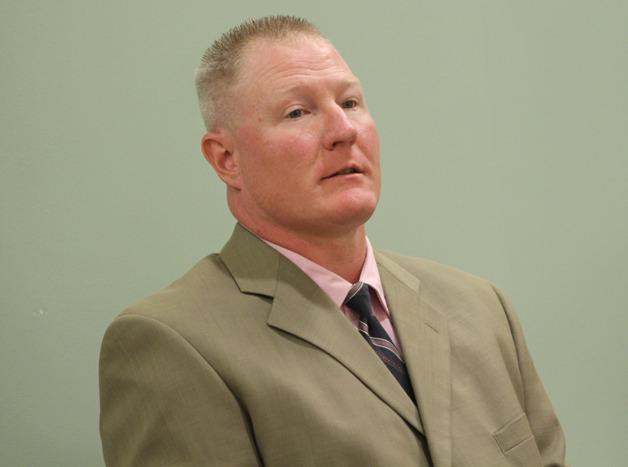There’s nothing unusual about the police using a ruse against a criminal suspect.
Such trickery can be “legal and appropriate,” said Island County Superior Court Judge Alan Hancock.
But, in interviewing Hodges Gowdey, a former deputy with the Coupeville Marshal’s Office, the Oak Harbor police tried to compel him to make statements through a fake internal investigation into a 2007 incident in which he allegedly handcuffed his girlfriend during a fight and later told her not to tell investigators about it.
The investigative tactic was inappropriately coercive and therefore his comments cannot be used against him at trial, Hancock found during an evidentiary hearing last Friday.
“He was essentially tricked into giving up his constitutional rights,” Hancock said.
On the other hand, Hancock denied a defense motion to dismiss a charge of witness tampering, ruling it didn’t matter if there was a criminal investigation at the time Gowdey allegedly asked the victim not to tell investigators about his alleged criminal conduct.
As a result, Gowdey’s trial is still set for June 24. He faces charges of unlawful imprisonment and witness tampering; both were charged as domestic-violence-related crimes.
POLICE ALLEGE that Gowdey, 44, got into a fight in 2007 with his then-girlfriend while he was on duty and handcuffed her on the side of a road after she threatened to drive off the road; he also allegedly later coached her not to tell investigators about the handcuffing incident, according to the police report.
The allegations came to light while Coupeville was disbanding the marshal’s office and entering into a contract with the Island County Sheriff’s Office to provide police services. Under law, Gowdey — the Coupeville department’s only remaining deputy — had the right to employment at the sheriff’s office if he passed the background check.
The background investigation, however, led to the criminal case against Gowdey. Island County Undersheriff Kelly Mauck looked into a 2007 internal investigation of Gowdey’s argument with his then-girlfriend outside Coupeville Town Hall. Mauck contacted the woman, who now claims that the argument continued beyond what she reported six years ago.
The former Coupeville marshal turned the criminal investigation over to the Oak Harbor Police Department in order to avoid a conflict of interest. Hancock noted that it was a “curious” decision since the alleged victim worked as a civilian employee of the police department.
DURING AN interview with police, Gowdey allegedly admitted he may have dented the woman’s car in the roadside incident, but said he didn’t remember if he handcuffed her. Gowdey said he didn’t think she was suicidal during the incident, according to the report written by then-Detective Sgt. Teri Gardner, who is now captain of the Oak Harbor Police Department.
Gowdey denied coaching the woman about what to say in the 2007 internal investigation.
It came out in recent evidentiary hearings, however, that Gowdey made those statements during a ruse largely concocted by Gardner.
Gowdey was led to believe Gardner was conducting an internal investigation of the alleged victim.
Christon Skinner, Gowdey’s attorney, argued that allowing the statements to be used against Gowdey in court would violate his Garrity rights, well-established protections that stem from the Fifth Amendment and a U.S. Supreme Court decision. Essentially, Garrity rights mean that public employees cannot be compelled to incriminate themselves during internal investigations.
Gowdey testified that he thought he had no choice, under department policy, but to speak with Gardner as part of the internal investigation. He understood that his statements could not be used against him in a criminal trial since he was protected by Garrity. He admitted that he was confused when she read him his Miranda rights, but not his Garrity rights.
“I asked her if I was a suspect in a criminal investigation. I said if I am, then this investigation is over,” Gowdey said.
He claimed Gardner didn’t admit that he was a suspect, but said she wouldn’t know until she interviewed him.
GOWDEY WAS well aware of his Garrity rights. He said he went through two internal investigations in Coupeville. He testified that he worked for 14 years in Coupeville, two years in Oroville and six months in Snoqualmie. He admitted he was fired from Oroville for lying to his boss.
“Mr. Gowdey was in a terrible dilemma,” Skinner said. “He could either cooperate and face discipline and the possibility of not being hired — or make statements that would incriminate himself.”
Hancock agreed and granted Skinner’s motion to suppress Gowdey’s statements, which he called “coerced” and “involuntary.”
Hancock said Gardner had an obligation to clarify to Gowdey that he was indeed a suspect in a criminal investigation, which she did not.
Skinner was particularly critical of Gardner during his arguments in court. He questioned her during the evidentiary hearing and was openly skeptical when she said she couldn’t remember details of an interview with him about a month prior.
Skinner called his paralegal to the stand and she testified that she didn’t have trouble remembering the details of the interview; she was in the room and took notes. She also disputed a couple of Gardner’s answers to questions, including whether she had probable cause to arrest Gowdey prior to the ruse.
Skinner said Gardner’s answers were “somewhat difficult to accept.”
“I don’t think the court should give her testimony much weight at all,” he said.



